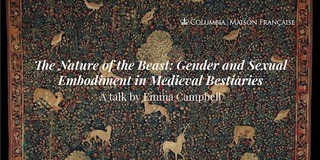Medieval bestiaries are moralized Christian accounts of the natural world, some of which were richly illuminated. These texts offer an invaluable resource for histories of gender and sexuality today. Yet their significance for such histories remains poorly understood and undertheorized. This talk emerges from a new book project titled A Moral Ecology of Creation, which addresses these gaps in our understanding of this major tradition and further argues for the significance of the French bestiary in this context. Focusing on bestiary creatures that challenge more conventional binary expectations of gender and sexual embodiment, my talk considers how current scholarship on gender and sexuality—including intersectional work in transgender studies and animal studies—illuminates the contemporary relevance of these medieval texts.
Emma Campbell is Associate Professor/Reader in the School of Modern Languages and Cultures at Warwick University and a 2023–2024 Fellow in the Society for the Humanities at Cornell University. Focusing on medieval textual traditions written in French, Campbell’s research considers how the study of medieval culture can speak to modern and contemporary ideas, notably in relation to feminist, queer, and transgender studies, postcolonial theory, and translation studies. Their scholarship is interested in how the medieval past and critical theory unsettle received ideas and, in so doing, offer ways to explore alternative perspectives on familiar concepts and historical narratives. Campbell has published on a broad range of medieval French texts prior to the fourteenth century, including two books: Medieval Saints’ Lives: The Gift, Kinship and Community in Old French Hagiography (2008) and, most recently, Reinventing Babel in Medieval French: Translation and Untranslatability (c. 1120–c. 1250) (2023).

